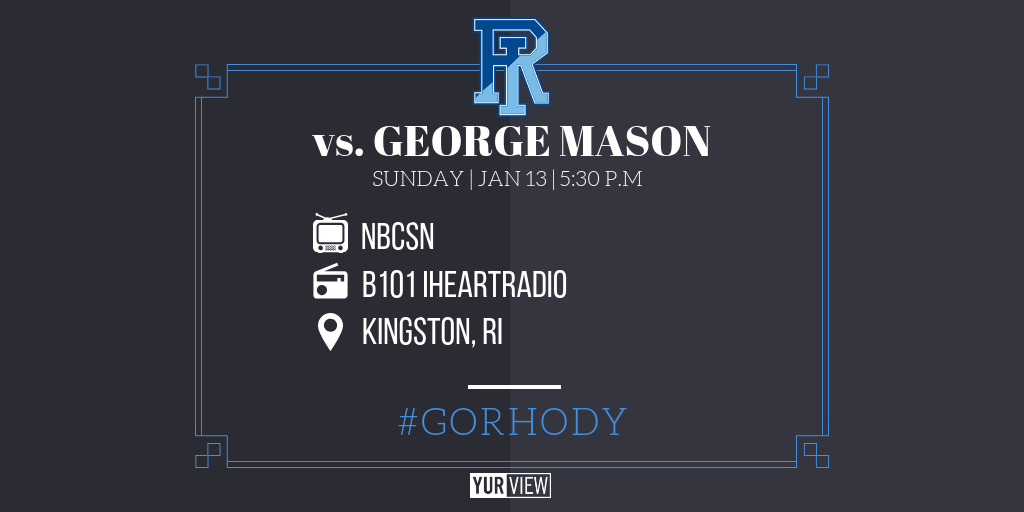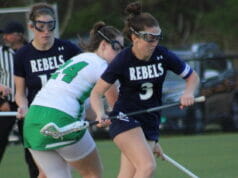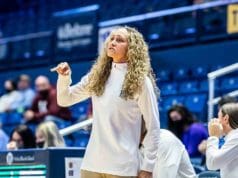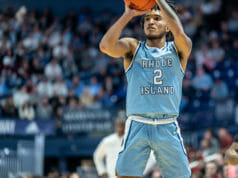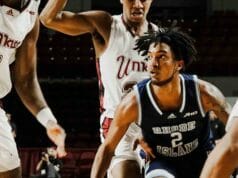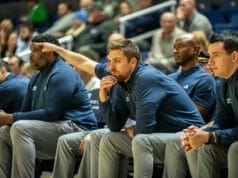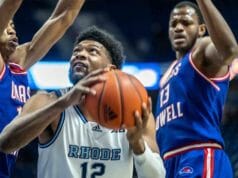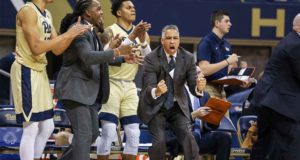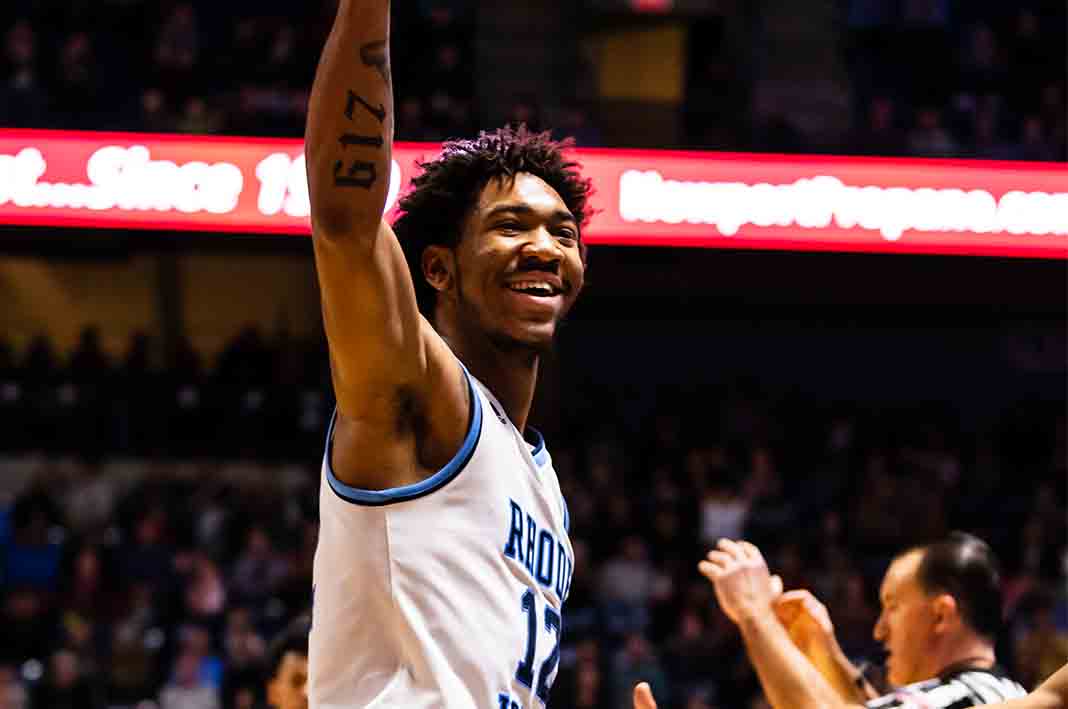
Rhode Island (8-6, 1-1) welcomed the consensus top-rated freshman class in the Atlantic 10 leading into this season. Among the group is 6-foot-7, 210 pound, forward Dana Tate from the MacDuffie School in Granby, Massachusetts. Now 14 games into his collegiate career, Tate is flourishing — averaging 7.2ppg and 4.6rpg in his last six contests and flashing a versatile blend of skills on both ends of the floor as his comfort level rises.
For the stat inclined, according to the URI Sports Information folks Tate’s plus-minus for the season now stands [post Richmond game] at +8.63 per 40 minutes (+46 in 213:08 of total floor time). That’s the best +/- statistic on the Rams this season. For the non-stat inclined, simply put, this means that when Tate is on the floor for the Rams – good things happen.
Atlantic 10 analyst and Yurview contributor Chris DiSano recently caught up with Tate prior to the win at Richmond to discuss his freshman experience at URI, the lessons he’s learned, and goals for the remainder of the year. Here’s what he had to say:
Chris DiSano: For those who may be unfamiliar with your background and the ‘how’ and ‘why’ of your decision to enroll at URI, can you describe what led you to Kingston?
Dana Tate: There are three main things that played a part in my decision to come to URI.
The first is that I’m from Boston, Massachusetts. The University is about an hour and half from my house and I’m a big family guy… so my mom and my grandmother and my nephew, they come to all my games and support me. It’s great for them to be able to witness my collegiate career and I wanted to go somewhere where they could make the games and come down whenever they wanted.
The basketball aspect was also great. Rhode Island was winning a lot of games, winning championships. They weren’t necessarily up-and-coming anymore because they had established themselves as one of the premier programs on the east coast and the country, realistically. That attracted me too because I wanted to play high level basketball but also play at a level where I thought I could be productive and I think that I would play well.
Lastly, of course academics played a part in it too. I’m a kinesiology major and the school is known for its science programs and science department. I learned that a high percentage of kinesiology majors at URI end up attending grad school whether at URI or somewhere else — so that was attractive too.
Those were the keys for me in choosing URI.
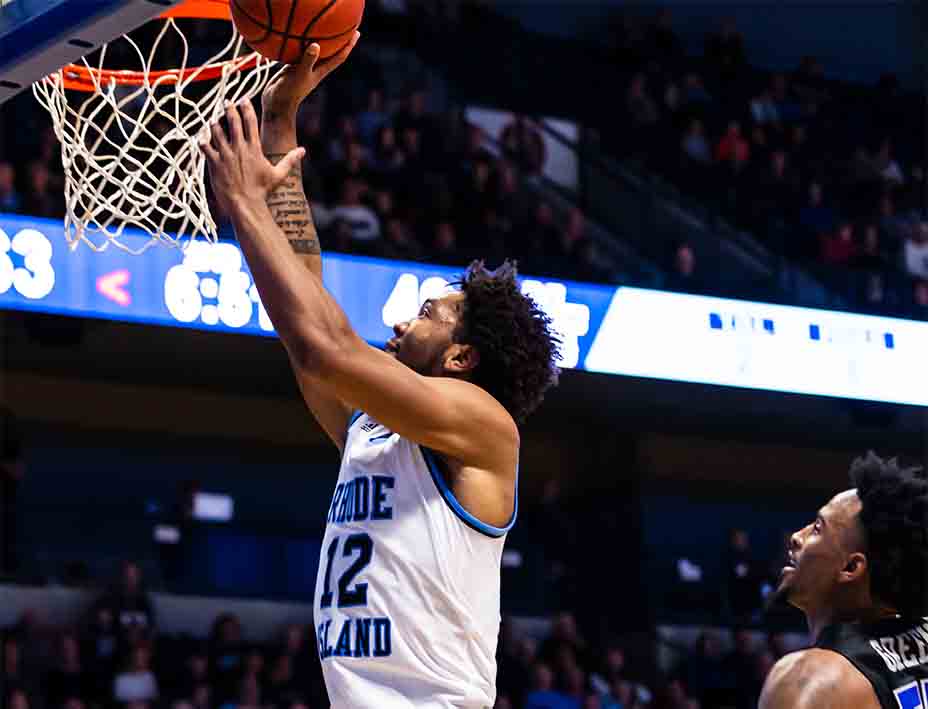
CD: In making the jump from high school to D-1 competition, can you reflect on: 1) a pleasant surprise aspect; perhaps something that has not been as challenging to adjust to as you envisioned pre-college; and 2) the opposite of that; an aspect that presented a greater challenge for you than anticipated?
DT: One aspect that was not as hard to adjust to was the work you have to put in to be successful as a team and as an individual. I come from a high school program where we worked hard every day, we put ourselves to the test, had boot-camps and military workouts, we prepared ourselves for a long season, and we formed a bond that made us brothers — and I feel like we have the same thing here. We may not have done a boot camp, but we’ve been around each other for months and spent so much time on the hardwood together, that we became very close and are one unit. We’re a group of guys that love each other, want the best for each other and will do what we need to for each other on and off the court.
Now, on the other hand, one thing that did take me a while to adjust to is the pace of the game and the physicality. I’ve always been a physical guy but here there are a lot of guys that are stronger than me, because I’m a young guy – just a freshman and only 19. These guys are really physical and strong and they move up and down the court at such a pace that it’s a challenge. Those were the two hardest to adjust to but I’m coming along with those two aspects now.
Paying attention to the scout, tips that my teammates and coaches give me, and battling with Cyril, Jermaine and Ryan on a day-to-day basis makes me ready to compete when it comes to the game.
CD: A natural segue from your thoughts there is to drill down on pieces of advice that have resonated and helped you. Are there any particular pieces of advice from teammates in particular – not staff – that stand out?
DT: I’ve gotten great advice from many of the guys. But two stick out.
One is very simple and told to me by Jeff, Fatts and CT — the older guys. They’ve said “[B]e confident, know you’re supposed to be here and that you can play at this level. Don’t let anyone tell you you can’t play here. Believe in yourself.”
The second thing, Cyril told me. He said “Yes, the game is fast but you have to play at your own pace. If you speed yourself up you will make mistakes. You can’t be sluggish and fall way behind, but try as much as possible to play at the pace you’re comfortable with and it will come.”
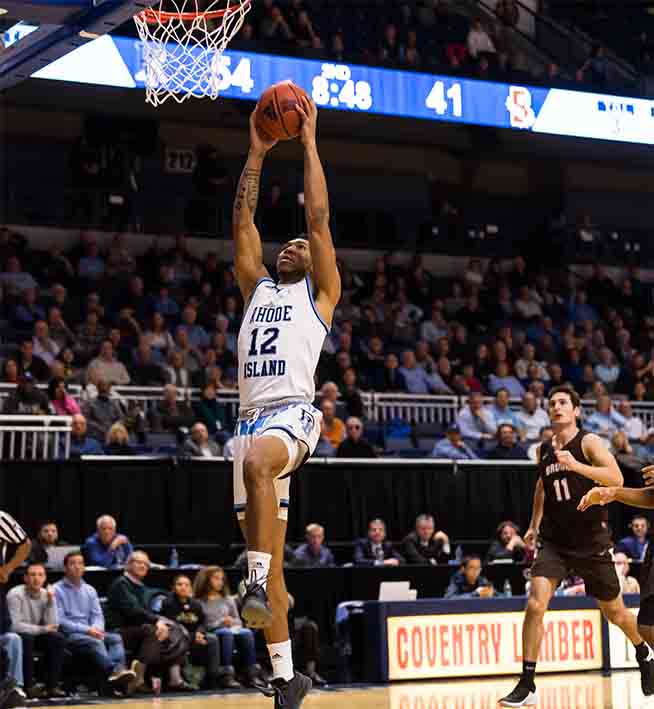
CD: What are your thoughts about the season overall and your take on the barometer of both the team’s and your own performance as you enter league play?
DT: As a team, I feel at this point in the season this is where we are going to start to make our strides. We’ve battled, played hard fought games and been through so much behind the scenes that this is where we make strides. Our chemistry has grown. I feel as though it’s going to be good for us to play in conference play and will give us a boost of confidence. Coach believes in us and he thinks we can go far and win the conference, and we do too.
And as for myself, I feel like I’ve made significant improvements in numerous aspects of the game from when I came. I wasn’t as good of a shooter or defender as I am now. Of course I still have areas to improve on, but I’ve made tremendous strides and I want to thank my coaches and teammates with helping me with all of that.
CD: It’s no secret that your playing with purpose and quite productive of late. To what do you attribute your increased output?
DT: It’s definitely me building my confidence. I’ve always been confident, but it’s growing and growing as we play. And my coaches believing in me. Coach Cox always tells me to play my game and has been asking me “When are you going to start hitting threes like you do in practice?” So he wants me to shoot, be aggressive… says “I need a three this game,” so them believing in me definitely helps.
CD: Conference play is a different animal. What about the Saint Louis game, if anything, was different for you as you competed in that one?
DT: The atmosphere. We’ve played away games and we’ve played against good teams, but that atmosphere and that arena was rocking. That was the loudest gym I’ve played in, and from what I’ve heard, that wasn’t even the loudest that it gets come conference play and that we’re going to play teams that have more fans and are even louder. I could barely hear Coach Cox on the court and he was yelling… and I could barely hear him.
CD: Let’s stay with the SLU game for a moment… you all were right there in that one late but the execution wasn’t crisp over the final five. What did the team learn from that experience?
DT: I think that the last five minutes showed our youth. We have to be better when it comes to late game pressure and we need to trust each other more in those situations as a team and as a unit. We have to be more trusting of each other. We played hard and played for each other, but we were inexperienced in that situation and learned from it.
CD: In the business world, it’s called “managing up.” I’m curious, even as a freshman, how you see your role in leading from the spot and role you currently occupy, in terms of how you interact with the veteran players and how you may try to positively influence your freshman peers?
DT: I always try to be there for my fellow freshmen. I’m always a guy that will listen. I may not always agree – and I’ll say that – but for the most part I will always respect everybody’s opinions. I always try to be there for my guys. I tell my fellow freshmen to get in the gym and get shots up with me and we do a good job of that, along with listening to the older guys and learning from them.
CD: As the season progresses, what are your personal goals?
DT: My goal is to keep improving at the rate that I am, keep trying to help my team win… and being a good teammate. Those are my goals individually. I want to be able to be someone my teammates can trust and depend on. That when I’m on the court I’m going to give them my all and do whatever it takes for the betterment of the team. I just want to win. I want the team to be successful for us but also for Coach Cox with it being his first season too.
CD: Okay, customary final, shout-out offer… anything else or anyone else you’d like to spotlight?
DT: I want to thank the Rhody fans and everyone for welcoming me here. Showing me love when I check into the game… I was the first of this class to commit and decide to stay during the coaching transition and I want to thank them for believing in me.



